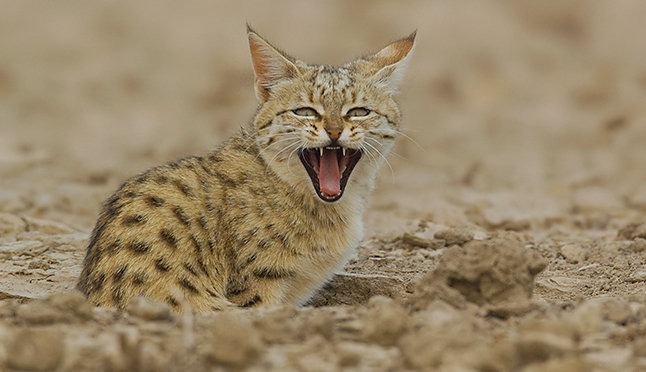20 Medium Size Wild Mammals of The Indian Subcontinent
The vast and beautiful Indian subcontinent is home to an incredibly rich diversity of mammals, including mighty tigers, big elephants, giant rhinos, as well as 14 primates and 20 deer species. Medium size wild mammals of The Indian Subcontinent are Dhole,Bengal fox,Himalayan wolf,Striped hyena and wild boar.
Clouded Leopard
The clouded leopard is medium size wild cat and one of the member of felidae family, found in the Himalayan foothills of India and has been classified as Vulnerable. Clouded leopards occur from the Himalayan foothills to northeast Indian states in the Khangchendzonga Biosphere Reserve.
Indian Wild Dog

Indian Wild Dogs are also known as Dhole,a highly social animal, living in large clans without rigid dominance hierarchies. Dhole are listed as one of the most endangered species of animal in India,occur in most Highlands and the Western and Eastern Ghats.
Indian Fox

Bengal fox also known as the Indian fox is endemic to the Indian subcontinent and is found from the Himalayan foothills. The Bengal fox feeds on rodents, reptiles, crabs, termites, insects and small birds.
Red Panda

Red panda is a small arboreal mammal native to the eastern Himalayas and has been classified as vulnerable. The red panda is the only living species of the genus and its range includes southern Tibet, Sikkim and Assam in India.
Indian Wolf

The Indian wolf is a subspecies of grey wolf and distributed across the states in the country. Himalayan wolf inhabit in the trans-Himalayan region of northern Jammu and Kashmir to few parts of Himachal Pradesh.
Nilgiri Tahr

Nilgiri tahr is an ungulate that is endemic to the Nilgiri Hills and the southern portion of the Western Ghats. The Nilgiri tahr is a stocky goat and the state animal of Tamil Nadu.
Striped Hyena

Striped hyenas are a bit smaller than spotted and brown hyenas species native to the Indian Subcontinent. The striped hyena only emerges in complete darkness, and is quick to return to its lair before sunrise.
Hog Badger

The Hog Badger is a curious and unique species which inhabits Southeast Asia. They are found on the Indian subcontinent starting from Sikkim and eastern parts of India.
Indian Pangolin

Indian Pangolin found in the plains and hills of India and categorize as endangered by hunting for its meat and for various body parts used in traditional medicine. The Indian pangolin is a solitary, shy, slow-moving, nocturnal mammal.
Indian Porcupines

Indian Porcupine has multi-banded black and white quills, quite an adaptable rodent, found throughout Indian Subcontinent. The Indian crested porcupine is nocturnal and creates underground shelters
Indian Otter

The smooth-coated otter is a species of otter found in most of the Indian Subcontinent. Smooth-coated otters are relatively large and often found in saltwater near the coast, especially on smaller islands.
Indian Wild Cat

Indian desert cat also known as Asiatic wildcat is a subspecies of Wildcat that primarily found in Indian Subcontinent. This Wildcat is one of the sub-species of 8 medium sized wild cats of Indian wild forest.
Nilgiri Marten

Nilgiri marten is the only species of marten found in southern India in the hills of the Nilgiris and parts of the Western Ghats. The yellow-throated marten is diurnal, and though arboreal, descends to the ground occasionally.
Lion Tailed Macaques

The lion-tailed macaque, one of India’s endangered mascot species,endemic to the Western Ghats of South India. India is home to 14 species of primate, a mammal that lived in the trees of tropical forest.
Indian Civet

The large Indian civet,small Indian civet and Malabar large-spotted civet are three species of viverrid endemic to the Western Ghats of India and Southeast Asia. Large Indian civets are solitary and nocturnal but were seriously threatened by habitat destruction, hunting and skin.
Indian Muntjac

Indian muntjac is known as barking deer due to the bark-like sound for alarm and one of the species of eleven different species of muntjacs spread across Asia. Indian muntjac is one of the 20 elegant species of deer of the Indian Subcontinent.
Grey Mongoose

Indian gray mongoose and Indian brown mongoose are a species of mongoose mainly found in southern Asia and southwest India.
Being carnivorous it feeds on many species ranging from rats to snakes.
Indian Jackal

Indian Jackal also known as the Himalayan jackal appear prominently in Indian Subcontinent. It is a subspecies of golden jackal and typically inhabits lowlands on the outskirts of towns, villages and farms.
Wild Boar

Indian Wild Boar is also known as the Andamanese pig and a subspecies of wild boar native to India. Andamanese pig is taller and more sparsely haired than the Eurasian wild pig,Tiger and Leopards are predators of wild boar.
Indian Fruit Bat

The greater Indian fruit bat also known as Indian flying fox is a species of flying fox in the Pteropodidae family. Like other fruit bats, the Indian flying fox eat fruits or lick nectar from flowers.








